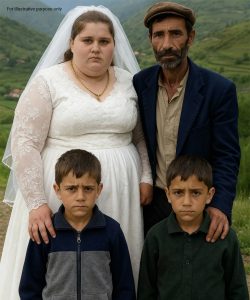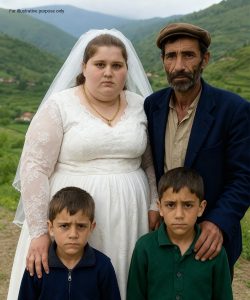Ellie’s life at the tender age of 16 was molded by her father’s oppressive control. She was timid, battling both her weight and self-worth in a small community where gossip ran rampant. Her father, strict and impatient, viewed her as an encumbrance. One fateful day, he made an astonishing announcement—she was to wed Caleb, a rugged mountain dweller, who was not only significantly older but also a widower with two young children. In that moment, Ellie’s world was turned upside down.
With tears streaming down her cheeks, she pleaded, “Why must I be the one?” Her father’s expression remained stoic as he replied, “Caleb requires a wife, and you need a purpose.”
Ellie had never met Caleb; all she knew were whispers of his isolated existence in the mountains. Fear surged within her—the thought of marrying an unfamiliar man and taking care of his children felt incredibly unjust.
The wedding itself was a blur of anxiety and apprehension. Clad in a simple dress, Ellie stood with trembling hands, absorbing the murmurs of the small town’s residents. Caleb, tall and weathered, was a man of few words. His dark eyes hinted at kindness, yet Ellie was too terrified to comprehend it. His children, Mia, aged 8, and Ben, aged 5, clung to him, eyeing her with wariness. To Ellie, it felt as if she had been thrust into a family that had no room for her.
The mountain cabin where they lived was cramped, cold, and distanced from their hometown. Adjusting to this new life proved challenging. Mia and Ben largely ignored her, still mourning their mother’s absence. Caleb often departed for hunts or woodcutting, leaving Ellie to fend for herself completely. She felt the weight of isolation deeply, and her struggles with her weight complicated even the simplest chores.
Night after night, she wept silently, fearing that her future was doomed to be that of a loveless marriage within a house that felt more like a prison.
In her attempts to connect with Mia and Ben, Ellie baked cookies, nervously offering the baked goods. Mia responded with a sneer, saying, “You aren’t our mother,” while Ben hid behind his father. Heartbroken but undeterred, Ellie drew upon her own lonely childhood for inspiration, vowing to remain patient. Gradually, she left them small tokens—a few carved sticks and wildflowers—in hopes of earning their trust.
Caleb, a man of enigma, spoke little, his face shadowed by grief. However, Ellie noticed the gentle way he cared for his children despite his rugged demeanor. One afternoon, he observed her struggling with a load of firewood. Without uttering a word, he took it from her. “You don’t have to manage everything alone,” he said in a raspy voice. It was the first time he had ever addressed her kindly, igniting a glimmer of hope in Ellie’s heart.
Life in the mountains tested her resilience.

Ellie’s body ached from the relentless chores of hauling water, scrubbing floors, and cooking over an open flame. Yet she chose not to complain. Observing Caleb’s relentless work ethic, along with the hungry faces of his children, filled her with renewed purpose. Then, one day, as Mia fell ill with a fever, Ellie stayed up all night, cooling her forehead with damp washcloths. Caleb silently observed, and she noticed the warmth in his gaze.
When Mia recovered, the little girl surprised Ellie with a grateful hug, whispering, “Thank you.” Ellie’s heart soared, and soon Ben was inclined to join in too, asking her for storytime. For the first time, she felt a glimmer of belonging, however small.
Her perspective of the mountains began to evolve—the towering pines, the crisp air, the serene silence—each element revealed its own beauty. She started walking daily, navigating through trails to clear her mind. Although the physical exertion was rigorous, it granted her strength, and she noticed her clothes becoming looser and her steps growing lighter.
What once evoked fear started to transform into her oasis. Gradually, Caleb began to share more of himself too. During dinner, he recounted tales of his late wife, Sarah, who passed away during childbirth. Ellie listened intently, her heart heavy with empathy for his suffering, and opened up about her own battles—her father’s cruelty, her ongoing struggle with weight. It was the first time they shared laughter, leading her to realize that Caleb was not the cold figure she had imagined but rather a man enveloped by his own grief.
Gossip from the town began to echo into their isolated mountain home. They referred to Ellie as “the overweight bride” and expressed pity for Caleb.
When she stumbled upon these unkind words, her old insecurities resurfaced like ghosts from the past. Seeking solace, she confided in Caleb, hoping for understanding. Instead, he affirmed, “They don’t truly recognize you. I see how hard you labor and how you care for Mia and Ben.” His words, though simple, were deeply encouraging.
As winter set in, a fierce blizzard encased them within the cabin, causing their food supplies to dwindle. Ellie ensured the children always ate first, making do with what they had. Noticing her sacrifices, Caleb began teaching her hunting skills. Her hands trembled with anxiety as she held the rifle, but his guidance instilled a sense of reassurance in her.
“You possess strength beyond what you realize,” he encouraged her.
Ellie’s connection with the children deepened. Mia began to assist her in the kitchen, while Ben sought her side, calling her “Mama Ellie.” She serenaded them with the melodies her own mother used to sing, filling the cabin with joyful sounds. In that moment, she recognized she was crafting a family.
One evening, as Caleb spotted her gazing at the stars, he remarked, “You’ve transformed.” And she had; her metamorphosis extended beyond the physical to a newfound inner strength that made her proud.
When a bear ventured too close, the once-timid Ellie found courage alongside Caleb, working together to ward it off. Later, with a gentle squeeze of her hand, he uttered, “You’re a part of this now.” Her heart raced, not from trepidation, but from the realization that love for him was blossoming within her.
During a visit from her father, Ellie stood resolute in the face of his harsh declarations, responding, “I no longer live for you.” When he departed, visibly shocked, Caleb nodded at her, conveying a sense of respect.
As time flowed, the children began to call her “Mom” with unwavering certainty.
Her transformation was unmistakable. Ellie had shed weight, not from shame, but born of hard-earned effort and clear intentions. One night, by the roaring fire, Caleb clasped her hand. “I never expected this,” she admitted. “However, I’m grateful you’re here with us.”
The annual village festival approached, and although Ellie was hesitant to attend, Caleb insisted they go as a family. With burgeoning pride, she strolled alongside Mia and Ben, and this time, the whispers she heard were filled with admiration.
At the festival, Caleb shocked her by kneeling down and presenting a simple ring. “Ellie, you’ve restored our family. Will you choose to stay with us not out of obligation, but out of desire?” Tears welled in her eyes as she nodded, prompting applause from the audience and tight embraces from Mia and Ben. This choice was no longer dictated by her father; it was a choice of love that she embraced willingly.
As life settled into a harmonious routine, the once-chilly cabin vibrated with love and laughter. Years later, when her father fell ill and sought forgiveness, Ellie chose to forgive him—not for him, but for her own healing. Within the mountains, she flourished, earning the title of “mountain mother” from townspeople who had once criticized her.
As time passed, Mia and Ben matured, but the love shared between Ellie and Caleb remained steadfast. One serene evening, Mia, now a teenager, inquired about Ellie’s past. With honesty, she shared her journey of fear, shame, and eventual transformation. “You are the strongest person I know,” Mia remarked, leaving Ellie in a state of awe.
As they watched the sun’s descent together—Constrained no longer by fear but empowered by love, Ellie had become a beacon of resilience and strength. Through her father’s harsh decision, she uncovered not only the essence of love and family but also rediscovered herself.
Turning to Caleb, she whispered softly, “You are my home.” He kissed her forehead gently, as together they prepared to embrace whatever the future held, firmly rooted in the mountains they had lovingly claimed as their own.
